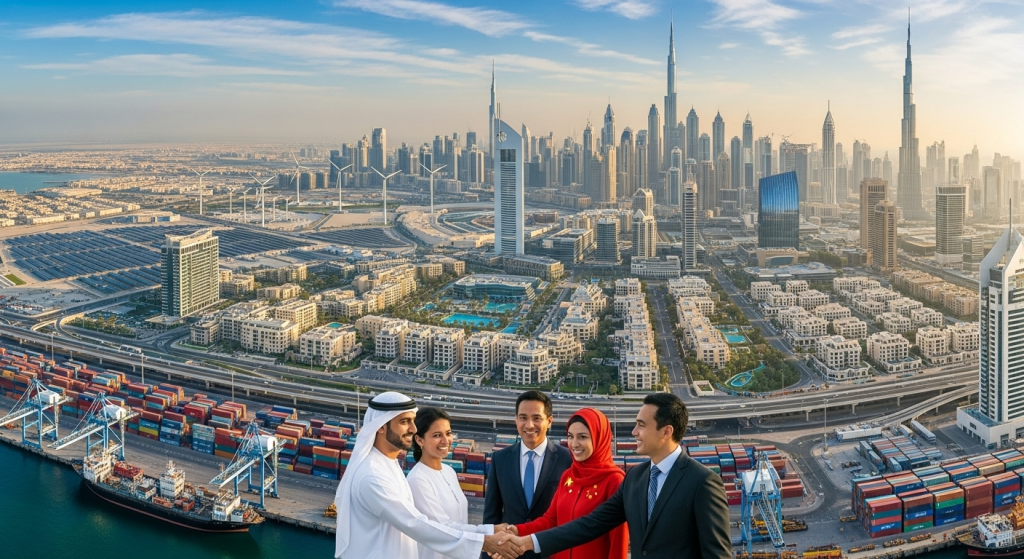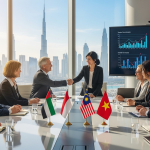The United Arab Emirates (UAE) continues to solidify its position as a global business hub through strategic partnerships with various Asian countries. This initiative not only aims to enhance trade relations but also to stimulate economic growth across multiple sectors. As the UAE seeks to diversify its economy away from oil dependency, these partnerships are becoming increasingly vital.
Current Economic Landscape
The UAE’s economy has shown remarkable resilience in recent years, with projections indicating a growth rate of around 4% for 2024. This growth is attributed to several factors, including increased foreign investment, a booming tourism sector, and a robust real estate market. However, the most significant driver has been the UAE’s proactive approach to establishing and nurturing trade partnerships, particularly with Asian nations.
Trade Partnerships with Key Asian Markets
In recent months, the UAE has entered into various agreements aimed at enhancing trade relations with countries such as India, China, and Indonesia. These partnerships are designed to facilitate smoother trade flows, reduce tariffs, and ultimately increase the volume of goods exchanged between these nations.
India
India remains one of the UAE’s largest trading partners, with bilateral trade exceeding $60 billion annually. Recent discussions between the two nations have focused on expanding this relationship further, particularly in sectors such as technology, renewable energy, and agriculture. The UAE’s investment in India’s infrastructure projects is also expected to yield significant economic benefits for both countries.
China
China has emerged as a critical partner for the UAE, with trade between the two nations reaching approximately $50 billion. The UAE has positioned itself as a gateway for Chinese goods into the Middle East and North Africa (MENA) region. Initiatives such as the Belt and Road Initiative (BRI) have further strengthened this relationship, leading to increased Chinese investments in the UAE’s logistics and real estate sectors.
Indonesia
Indonesia, as one of the largest economies in Southeast Asia, presents a wealth of opportunities for UAE businesses. Recent trade agreements have focused on enhancing cooperation in sectors like tourism, agriculture, and technology. The UAE’s investments in Indonesian startups have also been on the rise, indicating a growing interest in the region’s burgeoning tech scene.
Impact on the UAE Economy
The strategic partnerships with Asian nations are expected to have a profound impact on the UAE’s economy. By diversifying trade relationships, the UAE can reduce its reliance on traditional markets and mitigate risks associated with global economic fluctuations.
Job Creation and Economic Diversification
As trade volumes increase, so too does the potential for job creation within the UAE. Sectors such as logistics, technology, and tourism are expected to see significant growth, leading to new employment opportunities for both locals and expatriates. Furthermore, as the UAE continues to diversify its economy, it will be less vulnerable to downturns in the oil market.
Investment Opportunities
With the expansion of trade partnerships, numerous investment opportunities are emerging in the UAE. Investors are encouraged to explore sectors such as:
- Renewable Energy: The UAE is investing heavily in solar and wind energy projects.
- Technology: The rise of fintech and e-commerce presents lucrative opportunities.
- Tourism: With Expo 2020 Dubai attracting global attention, the tourism sector is poised for growth.
- Real Estate: The demand for residential and commercial properties continues to rise.
Challenges and Considerations
While the prospects for growth are promising, there are challenges that the UAE must navigate. Geopolitical tensions in the region, fluctuations in global markets, and the ongoing impact of the COVID-19 pandemic are all factors that could affect trade relationships. Additionally, the UAE will need to ensure that its infrastructure can support the increased trade flows and investment.
Regulatory Environment
The UAE government has been proactive in creating a favorable regulatory environment to attract foreign investment. Recent reforms in business setup regulations, tax incentives, and streamlined visa processes have made it easier for foreign businesses to operate in the UAE. These measures are crucial for sustaining the momentum of trade partnerships.
Conclusion
The UAE’s strategic partnerships with Asian nations are set to play a pivotal role in shaping its economic future. By fostering strong trade relationships, the UAE is not only enhancing its global standing but also creating a more resilient and diversified economy. As these partnerships continue to evolve, businesses and investors should remain vigilant and ready to seize the opportunities that arise.
For more insights on investment opportunities and business strategies in the UAE, visit Persian Horizon.
Source: https://www.emirates247.com/business








